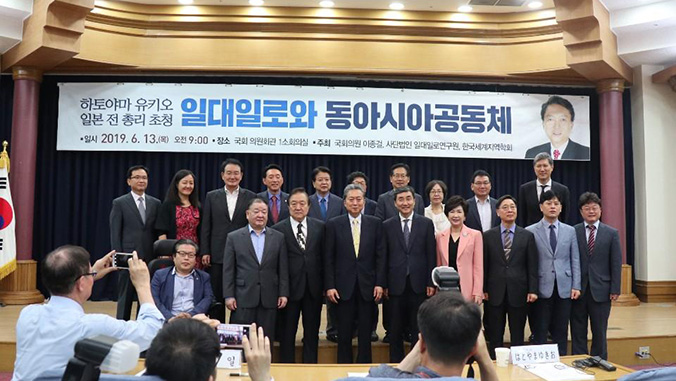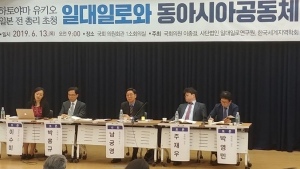
A University of Hawaiʻi at Hilo political science professor spoke at the National Assembly of South Korea about China’s Belt and Road Initiative (BRI) and the future formation of a proposed “East Asian Community.”
On June 13, four academics, including UH Hilo’s Su-Mi Lee, discussed how China, Japan, Korea and the United States perceived the BRI as well as the likelihood of creating an “East Asian Community” comprised of the three countries. Their discussion followed a speech by Yukio Hatoyama, former prime minister of Japan, about his initiative of forming the tripartite community based on the BRI.
“Hatoyama’s vision is to create a community of East Asian countries like the European Union. He believes that by forming a community like that, those countries can keep each other in check and maintain peace in the region,” Lee explained about the key points of Hatoyama’s proposal.
Lee said the vision has not been well received by the United States. When Hatoyama was the prime minister of Japan from 2009–2010, among a number of other reasons, he was viewed as anti-American because he advocated strengthening the relations among China, Japan and Korea. Lee said Hatoyama’s intention was not to keep the U.S. out of East Asia by establishing a community of the three countries, but some in Washington viewed it otherwise.

Pros and cons of international development
Hatoyama thinks that three countries’ collaboration in BRI projects could be a starting point of forming the East Asian Community. Yet, Japan is still hesitant to join the BRI, worried about upsetting the U.S.
“BRI is a global development plan initiated by China in 2013. It loans funds to many developing countries that need to build or upgrade their infrastructure,” said Lee. “Some people compare BRI with the Marshall Plan executed by the U.S. after WWII. They view BRI as a stepping stone for China to expand its influence around the world and as China’s attempt to replace the U.S. Obviously, Washington is highly critical of BRI and discourages countries from taking part in it.”
Lee expresses how this topic of the discussion was close to home for her. In her spring 2019 international organization course, she led class discussions on international development policies, and students from the South Pacific islands shared that Chinese companies have been building schools and hospitals in their countries.
“That is all part of China’s BRI projects,” Lee continued. “Like any other global development program, BRI has its pros and cons. Washington perceives that BRI is part of China’s multifaceted plan to replace the United States in the world and pressures countries not to take part in BRI. However, the ultimate decision on whether or not to join BRI is and should be up to each country.”
The discussion session at Korea’s National Assembly was sponsored by the majority leader of the National Assembly of Korea, Belt and Road Initiative Research Institute of Korea and International and Area Studies Association of Korea. It was well attended by prominent politicians and academics.
Lee said she was honored to be part of the discussion panel that prominent political leaders attended. She added that some research institutes in Korea expressed interest in working with her for their events next year.

